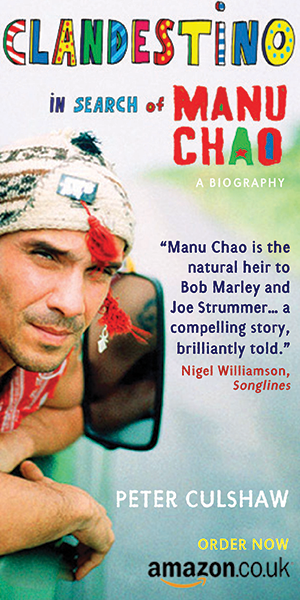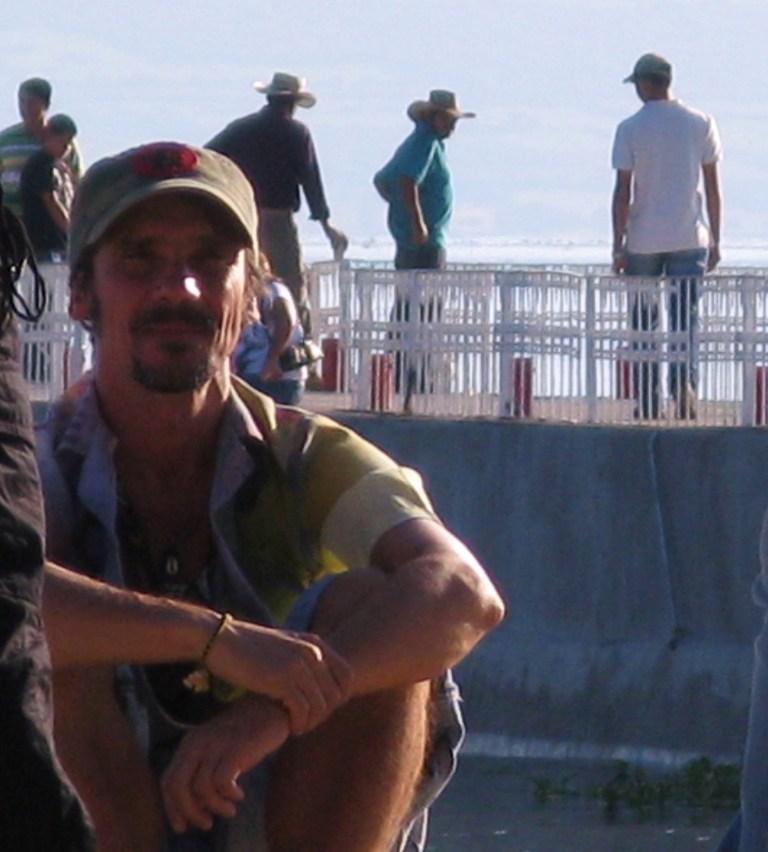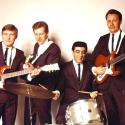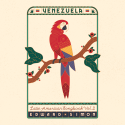Lake Chapalá begins just south of Guadalajara in the state of Jalisco. In case there’s any doubt we’re in Mexico, a mariachi band are propositioning the families who stroll along the waterfront and doing good business in their silver tunics and red cummerbunds. A shoeshine boy with his box and brush is pointing hopefully at dusty footwear, and another boy is selling hammocks. Couples are sweetly holding hands on their Sunday-morning paseo. It’s a tranquil scene.
Glittering dark birds skim the surface of the water and waterfowl wallow in the reeds. Swallows swoop and elegant white egrets perch among the water hyacinths. I’m told there are ten kinds of fish in the lake. But it’s drying up. The jetty and the lighthouse are further from the water’s edge than they used to be.
In my head, Aztecs blood sacrifice mixes with narco gangs
We’ve come here to have lunch before the sound check for tonight’s concert. The view prompts Manu to mention his mother’s prediction that the wars of the 21st century will be about water. He talks about an article on the Amazon which he saw in the French international affairs periodical Le Monde Diplomatique that suggests the multinationals are already positioning themselves for the Water Wars. He quotes the famous Uruguayan writer Eduardo Galeano: "The yachts and ocean liners are rising in response to new opportunities, but many rafts and lifeboats are taking to the water – and some are sinking."
I’m observing the watery scene and tuning out. Lake Chapalá was the place where that other nomadic artist D H Lawrence lived for a while at the end of a "savage pilgrimage" that took him to Australia, Sicily and New Mexico. Like Manu, Lawrence had an aversion to the coldness of the mechanised world and, also like Manu, he was a prophet of the instinct, claiming that Europeans thought too much, though in Lawrence’s case his "thinking with the blood" strayed into protofascism. He wrote most of his strange late-period book The Plumed Serpent in a villa in Calle Zaragoza, just by the lake.
 The book’s two Mexican protagonists are revolutionary leaders, but they’re also resurrected incarnations of the Aztec deities Quetzalcoatl and Huitzilopochtli, who revive the ancient tradition of human sacrifice. In my head, Aztecs blood sacrifice mixes with narco gangs. La Familia, one of the main drug cartels, are based in the neighbouring city of Michoacán. They’re the fastest-growing drug gang, founded by Nazario Moreno González, whose nickname was El Más Loco (The Craziest). Twenty men had recently burst into a low-rent disco called the Sol y Sombre in Uruapan and bowled five decapitated heads across the disco floor. They left a message behind that read: "Know that this is divine justice." For a modern drug boss, a reputation for being the craziest is a distinct advantage.
The book’s two Mexican protagonists are revolutionary leaders, but they’re also resurrected incarnations of the Aztec deities Quetzalcoatl and Huitzilopochtli, who revive the ancient tradition of human sacrifice. In my head, Aztecs blood sacrifice mixes with narco gangs. La Familia, one of the main drug cartels, are based in the neighbouring city of Michoacán. They’re the fastest-growing drug gang, founded by Nazario Moreno González, whose nickname was El Más Loco (The Craziest). Twenty men had recently burst into a low-rent disco called the Sol y Sombre in Uruapan and bowled five decapitated heads across the disco floor. They left a message behind that read: "Know that this is divine justice." For a modern drug boss, a reputation for being the craziest is a distinct advantage.
Meanwhile, in Guadalajara, there have been regular outrages, like the murder of 26 young men who were found stuffed inside three vehicles with the words "Millennia Zetas" and "Millennium" painted in oil on their bodies. Both are references to allied drug cartels. All the men had been asphyxiated.
Tonight’s show is at a venue just outside Guadalajara, the Arena VFG, named after the singer Vicente Fernández (Gómez) who lives nearby. He’s a huge star in Mexico who sings ranchero music with its torrid tales of the old Mexico: revolution, rural ranches and philandering caballeros. Arena VFG is a 15,000-seater indoor arena that has played host to bands like Judas Priest and Iron Maiden as well as top boxing matches. When the Mexican boxer Sal ‘El Canelo’ Álvarez beat a top Argentine, Vicente Fernández offered him a horse.
Watch Manu Chao performing "Volver, Volver"
As ever, before the show, Manu becomes introverted and thoughtful. He might have a whisky or a beer to take off the edge, but a certain terror seems to be a necessary part of the ritual. Like some actors before they go onstage, or some journalists sitting in front of a blank screen, the dreaded thought is always there: maybe this time it really will be a total screwup.
The band walk onstage, one by one. Angelo Mancini, the trumpet player strolls on jauntily. Bassist Gambeat lopes on. Guitarist Madjid Farhem runs to his amp with his arms wheeling like a demented aircraft. Drummer David Bourguignon, keyboard player Julio García Lobos and Philippe ‘Garbancito’ Teboul on percussion follow. Finally, Manu runs to the lip of the stage and the crowd erupt.
Gambeat drops the bassline, just for the sheer pleasure of joining the music again after a theatrical pause, like a child who deliberately loses a toy for the joy of finding it again
The atmosphere is transformed. I get the feeling that, if Manu were to ask the audience to take up arms, overrun the local radio, trash the police station, occupy the army barracks and government buildings right after the gig, he would conscript an instant army. The show is more intense that those in Europe on every level. It’s more playful, as Madjid mimes catching the waves of energy coming and throwing them back to the audience, grinning. Gambeat drops the bassline in a couple of numbers, just for the sheer pleasure of joining the music again after a theatrical pause, like a child who deliberately loses a toy for the joy of finding it again.
We are all dissolving into one energy field, a group monster.The rhythm section is locked in and earthy, the bass below the ground. Madjid’s guitar shimmers electrically through the seven different realms of mythology. Angelo’s trumpet could have brought down the walls of Jericho. And, at the centre of it all, there’s Manu, the little magus of this mayhem, the ringmaster of this circus.
Numbers flow into each other: "Mr Bobby" segues into "Primavera" into "Me Gustas Tú" into "Politik Kills". "Welcome To Tijuana" is dedicated to all those migrants killed on the border (see video below). For "Clandestino", the band exits the stage, leaving just Madjid and Manu behind. Then they’re back and the line "Mexicano illegal!" from "Desaparecido" is greeted with a roar, before the band ramp the heat up even further with old Mano Negra numbers "King Kong Five" and "Sidi H’Bibi". A rare cover – José Jiménez’s classic Mexican tune "Volver, Volver" (see video on previous page) – gets an inflammatory punk-ranchero treatment and goes down a storm.
Then it’s all over. The band are wiped out but exhilarated. ‘It was like a temazcal out there,’ Manu says, referring to a pre-Hispanic sweat lodge that, he explains, was used as a kind of healing sauna. Not many fans have managed to get into the backstage area, but Manu, of course, chats to them for at least an hour, posing for shots taken on their camera phones.
The audience empties out of an arena strewn with the detritus of an apocalyptic party, the aftermath of a pleasure storm. The banners in the auditorium, fierce and beautiful after the battle, are still standing. And they’re part of the story. The biggest celebrates the struggle of the striking teachers in Oaxaca, that most atmospheric of Mexican towns.
Are you on the bus or off the bus? That was the question posed by Ken Kesey and his Merry Pranksters during his epic road trip around the States with his fellow freaks in 1964. I’m still not sure of my status with Manu and his own pranksters, and have received differing answers as to whether I’m allowed on the tour bus but I decide just to walk on anyway. Paget Williams, the tour manager, grins as I get on. I seem to have passed some obscure test.
The tour was originally going to visit the colonial city of Morelia, but there has been a drug gang outrage there. The week before, on Independence Day, grenades were thrown into a crowd of civilians who were innocently celebrating the holiday. Seven people died and over a hundred were injured. Now, everyone is feeling unsafe.
The landscape is repetitious, like a minimalist piece of music. The bare scrub and grasslands are alleviated only by these giant pink ferns that I keep seeing, even though I haven’t taken any drugs.
Elizalde was shot dead, one of literally dozens of narcocorrido stars that have met the same fate
A Valentin Elizalde song wafts over the sound system in the courtyard of our hotel when we get to Querétaro. "It’s the Mexican equivalent of gangsta rap," Manu explains. It’s played polka-style by ageing gents on guitar, bass, accordion and drums. The songs are often paeans to drug lords and tell approvingly of murder, torture, extortion and drug smuggling.
The style was developed in the 1930s but has spread in the last couple of decades. The life of a narcocorrido singer is a dangerous one. Valentin Elizalde was shot dead, one of literally dozens of narcocorrido stars that have met the same fate.
I ask Manu about the banner that I’ve seen onstage, the one for the FPDT, the People’s Front for the Defence of the Land. It’s a story that Manu has been getting increasingly involved in. The FPDT was formed in response to plans to develop an airport at San Salvador Atenco, on the edge of Mexico City. The project was peacefully and successfully resisted in 2002 by 500 farmers and their supporters, who included Subcomandante Marcos and the Zapatistas. A grand scheme for the airport to become part of an "industrial corridor" through Mexico was dropped. It was a significant victory, which embarrassed the government.
Then another dispute kicked off in 2006, when police tried to stop sixty flower vendors from selling their wares at the local market in Texcoco near Atenco. Things rapidly escalated. The flower sellers called on the FPDT and Subcomandante Marcos came to the town and talked about how all these anti-state movements should come together in what he called "The Other Campaign". The protest began to have a powerful symbolic value.

Around 300 protestors blocked the highway and a policeman was injured, an incident which was caught on camera and replayed endlessly on national TV. The next day, up to 3,500 policemen responded with extraordinary violence and crushed the protests. Armed with sketchy intelligence about the ringleaders, they knocked down the doors of suspected homes, trashed them and brutalised their inhabitants. A 14-year-old boy, Javier Cortés, was killed by a police bullet.
A university student called Alexis Benhumera died from head wounds. Women were raped. A report by the National Human Rights Commission claimed that 207 people had been injured and 26 women suffered sexual assault. Several protestors, but none of the perpetrators of the violence, were jailed and a dozen of them received ridiculously long sentences. Ignacio del Valle, the "intellectual author", who was considered the troublemaker-in-chief, was handed a 100-year jail sentence. We’re due to meet his wife, Trini, in Mexico City.
For Manu, what happened in Atenco was simply ‘state terrorism’,a phrase he went on to use with maximum impact the next year, when he returned to Guadalajara for the International Film Festival
I track down a Cuban friend, Juan de Marcos González,from the Afro-Cuban All Stars (and musical director of the Buena Vista Social Club album) and finish the evening at Plaza Garibaldi, the Mecca for mariachi bands. A wizened guy who looks old enough to have fought with Zapata shuffles up and offers me a cigar. He also has a contraption for giving people an electric shock. Naturally, I’m buying. You have to choose a dose between one and 10. I choose seven and, yes, it’s a hell of a jolt, all for five pesos.
Manu doesn’t usually surface till midday, so I spend the next morning doing essential tourist stuff including the Frida Kahlo Museum and the Museum of Anthropology. Manu still isn’t back at the hotel at lunchtime. I head to the venue, the Foro Sol, a sports arena which is home to the Red Devils, theDiablos Rojos del México, a Mexican Baseball League team. We’re assured that the place will be nearly full to its 55,000 capacity, which is about the same size as the Shea Stadium where the Beatles played in 1965 – the biggest gig ever at the time. The rain starts coming down in sheets, monsoon-style. Manu’s absence is explained – he’s been on a cloakand-dagger mission to visit Ignacio del Valle and the other prisoners in Atenco prison. Several of the activists from the FPDT are there at the Foro Sol, along with Ignacio’s wife,Trinidad Ramírez, or ‘Trini’ for short. Backstage there’s a solemn ceremony. Manu and Gambeat are each given a bandana, a straw hat and a machete. "The machete doesn’t mean violence," Trini says. "It is a symbol of the defence of the land and the heart of Atenco." Hortensia Ramos, also from the FPDT, explains that the bandana is "a symbol of the sweat of labour and marches, the tears of the mothers of political prisoners, to wipe the tears and sweat of Atenco, as well as the Chiapas and Guerrero".
What might, in other circumstances, at least to an English sensibility warped by Monty Python, have a certain comic potential, is actually quite moving. The ceremony is given extra weight by the apocalyptic rain, the 50,000 strong crowd outside and the complete sincerity of Manu, Gambeat and the macheteros from the FPDT.
I’ve never seen Manu quite so fired up and passionate before a gig. and this translates into a powerful performance by the band. The rain has eased off, but such a vast crowd needs warming up and, to begin with at least, the intensity is at a lower wattage than in Guadalajara. But the set starts to soar about halfway through, powered by the rhythm section of David, Philippe and Gambeat, with Julio’s keyboards adding bedrock to the Madjid and Manu show up front. Angelo’s trumpet is perfectly "Mexican".
The crowd really kick off when the band play "El Hoyo", the song about their city, and "Volver, Volver". Then Trini ibrought onstage. "Here we are," she shouts. "We want you to remain free and enjoy. Be happy!" The audience as one shout "Libertad! Libertad! Libertad!" in return. The universal cry for freedom echoes through the centuries.















Add comment